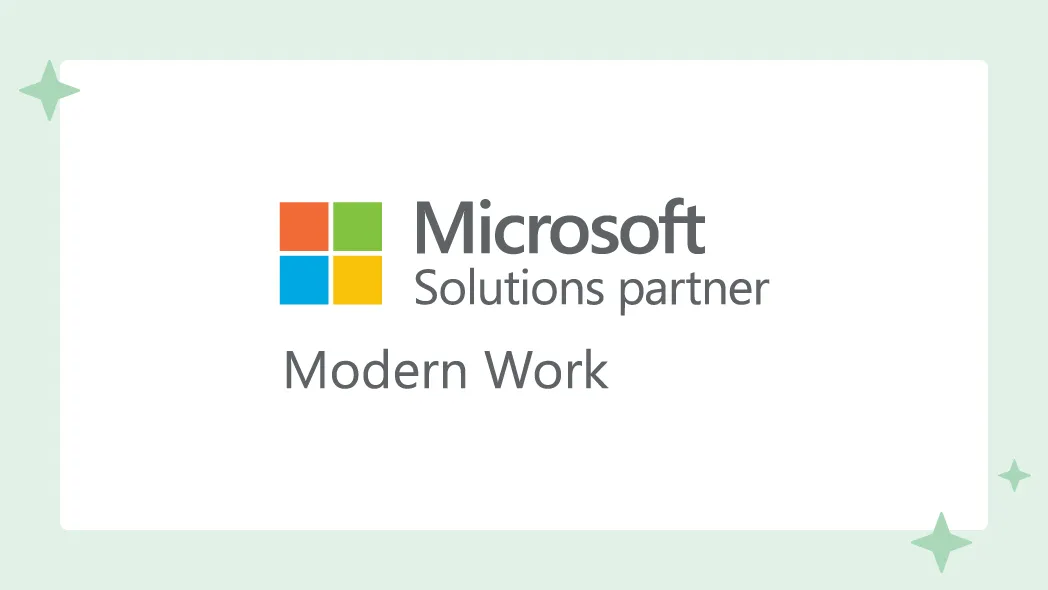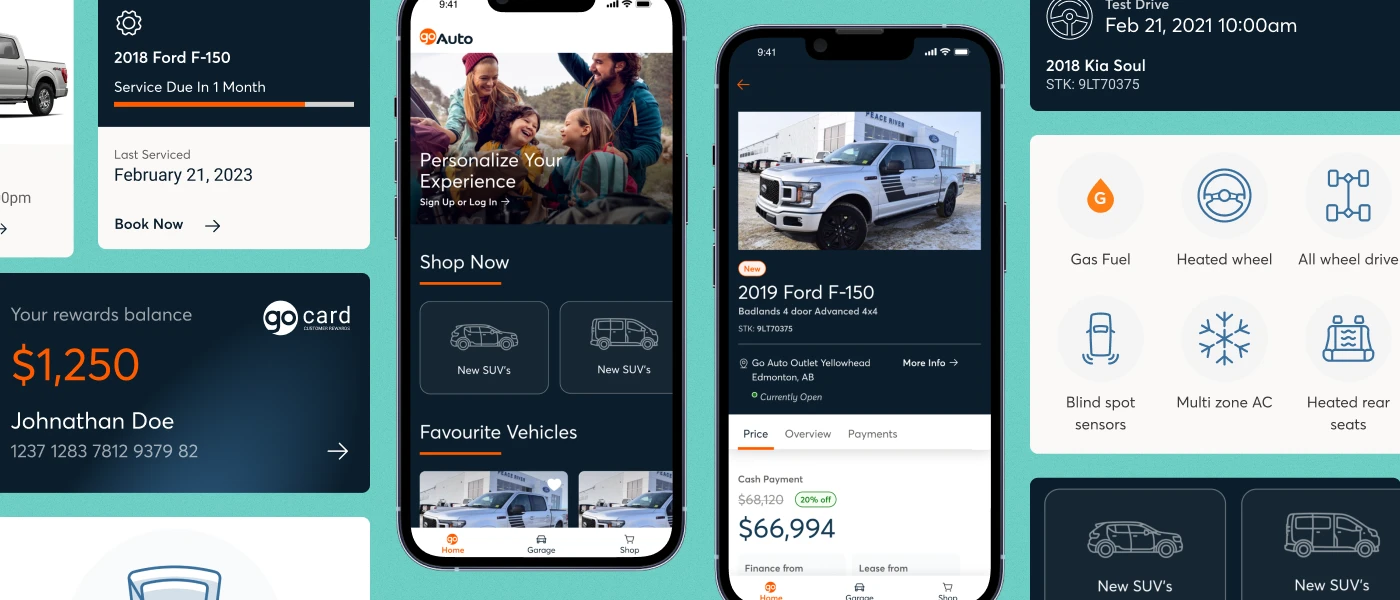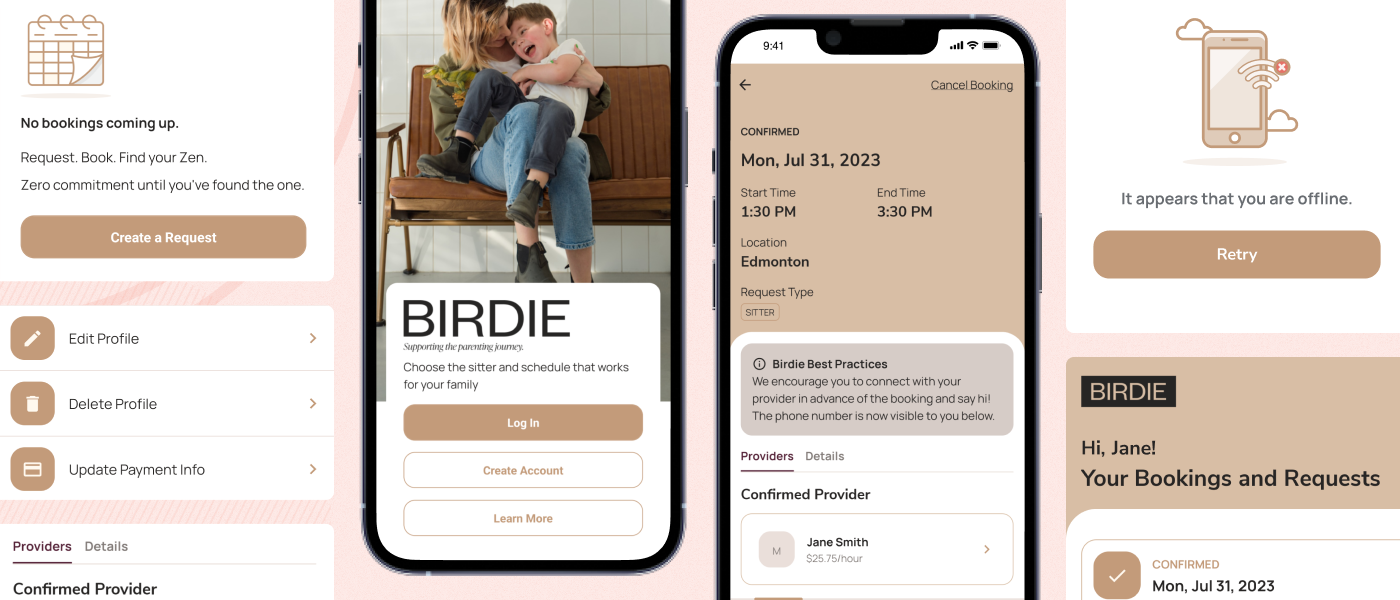custom software development
Build Meaningful Connections with Mobile Applications

What are Mobile Applications?
Mobile applications are custom software applications developed and built specifically for mobile devices and their respective operating systems.
The near ubiquity of mobile phones globally has made mobile applications a true necessity for every business. Using mobile apps, companies can transform existing products into a habitual lifeline (i.e. banking apps) or even create entirely new business offerings that become significant sources of revenue. Fun fact: Starbucks holds over $1 billion within its app at any given time due to its in-app payment functionality—a cash balance that would rival most banks and credit unions.
“We need an app!” is one of the most common phrases we hear at Punchcard. And oftentimes, it truly is what our clients need. But how do you know where to start?



Why Choose to Develop a Mobile Application?
While they are inherent similarities between web and mobile apps, there are also some key differences between the two that you should know about. Understanding the main advantages and disadvantages of mobile apps is very important to know before you dive in and start building a mobile app:
Pros
Higher Quality Performance
Since mobile apps are created in alignment to the standard protocols of a specific operating system, they tend to be higher performing— meaning better device compatibility, security, and quality.
Better User Experience
Mobile operating systems have their own standard protocols which helps create a more seamless and effective user experience.
Inherent Discoverability & Usage
Mobile apps can be discovered organically in their respective app marketplaces.
vs
Cons
Resource & Cost Intensive
Each mobile operating system requires its own version of your application—making mobile apps a larger investment of both time and money.
Beholden to Third Parties for Approvals
Apps must be approved and released through respective marketplaces—making it difficult to time product launches and new app updates.
Constantly Changing Compliance Standards
Mobile operating systems change their standards and protocols according to their own product timelines—it can be difficult and costly to maintain apps to ensure consistent alignment to ever-changing standards.
It is hard to know which of these pros and cons will impact the overall success of your app—or if you even need a mobile app at all.
When you work with us, the first and most important part of our process is the Strategy phase, where we align your project to specific outcomes and metrics, as well as understand your users and what their pains and gains will be.
Knowing what we want to achieve instead of what we want to build will help us make better decisions and get to your desired outcomes.



Why Punchcard Should Build Your Mobile App
We have built many mobile applications in our lifetime.
We have refined and optimized our process to make sure we are developing with efficiency and effectiveness.
This commitment to mastery isn’t only related to technology but we've also levelled up how we work with your team to ensure that whatever we're building actually solves the true problem you're trying to solve.
Our Team
What makes us different from other software developers is our people. You can count on us to have the right skills, expertise, and ability to work together to solve unexpected problems and navigate change throughout the life of a project.
Our Process
With scope, timelines, and budgets constantly changing, digital projects are full of unknowns. Rather than focus on the outputs we want to build, we instead focus on the outcomes you want to achieve and adapt a budget and timeline to meet your needs.
Our Technology
In keeping with our core values, we are always maintaining our existing knowledge while learning about new and emerging technologies to understand how they can help us create better applications for our clients.



Use Cases for Mobile Apps



What Technology Do We Use to Develop Mobile Apps?

React
React is a powerful, flexible JavaScript library developed by Meta to help build user interfaces (UIs) that are fast, scalable, and interactive. The open source tool has become one of the go-to frameworks for modern web developers looking to create single-page, mobile, or server-render applications.

React Native
React Native is an open-source framework developed by Meta that allows developers to build native mobile applications for iOS and Android using JavaScript and React. React Native supports cross-platform development to reduce time and costs while ensuring a seamless, consistent user experience.

Flutter
Flutter is an open-source user interface software developed by Google to create cross platform applications from a single codebase for mobile, web, desktop, and embedded devices. Trusted by well-known brands around the world, Flutter streamlines the app development process allowing you to reach users on every screen.

Ionic
Ionic is an open-source framework for building cross-platform mobile applications using web technologies like HTML, CSS, and JavaScript. It provides flexibility and enables developers to rapidly create data-centric mobile apps for iOS, Android, and even the web from a single codebase.



What Platforms Do We Build Mobile Apps On?

Android
Developed by Google, Android is a mobile operating system and open-source software for smartphones and tablets. Android powers over 70% of smartphones worldwide including Samsung and the Google Play Store has over 3.5 million apps available for download—making Android apps a key way to reach a global audience.

iOS
Developed by Apple, iOS apps are software applications designed to run on iPhone, iPad, and Apple Watches. With over 1 billion active devices and 2.2 million apps in the Apple App Store, iOS holds a significant market share in Canada, the United States, and Europe—making iOS apps vital for any mobile app development project.

Xamarin
Xamarin is a cross-platform mobile app development framework owned by Microsoft that enables developers to create apps for iOS, Android, and Windows using a single C# codebase. Xamarin integrates with Visual Studio and remains a popular choice for businesses looking to build native-like apps efficiently.



You Might Also Like
Featured Posts

Designing Great Customer Experience with Go Auto
Read more: Designing Great Customer Experience with Go Auto
Launching a new childcare startup with Birdie
Read more: Launching a new childcare startup with Birdie



Ready to go Mobile?
We're guessing you read this entire page on your smartphone, didn't you?
Mobile apps have become essential tools for businesses looking to connect with their customers, streamline operations, and stay ahead of the competition. A well-designed app puts your business directly in your users’ hands—literally—offering seamless accessibility, personalized experiences, and a permanent presence on their devices they're inevitably glued to day in and day out.
At Punchcard, we understand that building a mobile app is more than just developing software—it’s about creating a solution that aligns with your strategic goals and delivers real value for your users.
Are you ready to transform your promising idea into a high-performing mobile app? Book a consultation with us and let's build the next great mobile app together!



FAQs
What is the cost of developing a mobile app? How long does it take to build a mobile app?
Cost and timeline of developing a mobile app will vary based on your app’s complexity and functionality, required platforms (iOS, Android, or both), and custom design and features. We work closely with you to create a solution that fits within your budget, timeline, and business goals.
Which is better for my project or idea: a native app or cross-platform app?
Native applications offer the best performance and user experience while cross-platform apps will save you time and cost by using a single codebase for multiple platforms. We work with your team to recommend the best approach based on your unique needs and requirements.
How do you ensure a mobile app is user-friendly and engaging?
Our team prioritizes user experience (UX) and user interface (UI) with in-depth research, intuitive design, and usability testing to ensure your mobile app is easy to navigate and keeps users engaged.
Do you provide post-launch support and updates?
We can offer ongoing maintenance, updates, and support to ensure your app stays relevant, secure, and functional as your business evolves.







